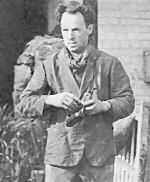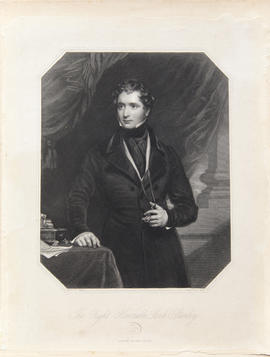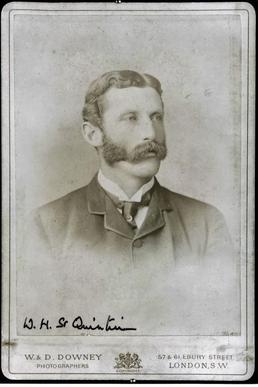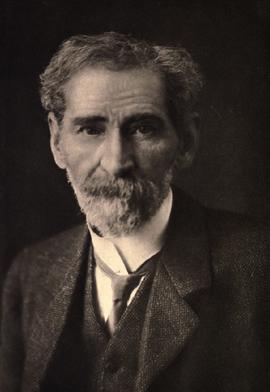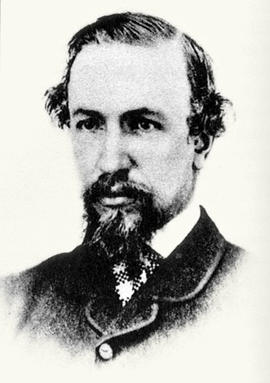Andrew Dickson Murrary was a Scottish lawyer, botanist, zoologist and entomologist. Murray studied insects which caused crop damage, specialising in coleoptera. In botany, he specialised in Coniferae. He served as president of the Royal Physical Society of Edinburgh during 1858-59. Murray was a prominent opponent of the Darwin-Wallace model of natural selection. Murray believed that hybridisation was a better explanation for mimicry than natural selection. In 1860, Murray reviewed Darwin's On the Origin of Species in the Proceedings of the Royal Society of Edinburgh
George Brettingham Sowerby II was a British naturalist, illustrator and conchologist. Together with his father, George Brettingham Sowerby I, he published the Thesaurus Conchyliorum and other illustrated works on molluscs. He was elected a Fellow of the Linnean Society on 7th May 1844. He was the father of George Brettingham Sowerby III, also a malacologist
Ronald Mathias Lockley was a Welsh ornithologist and naturalist. He wrote over 50 books on natural history, including a major study of shearwaters. He is perhaps best known for his book The Private Life of the Rabbit
Edward Smith-Stanley, 13th Earl of Derby was a politician, peer, landowner, builder, farmer, art collector and naturalist. He was the patron of the writer Edward Lear.
In 1834 he succeeded his father as 13th Earl of Derby and withdrew from politics, instead concentrating on his natural history collection at Knowsley Hall, near Liverpool. He had a large collection of living animals; at his death there were 1,272 birds and 345 mammals at Knowsley, shipped to England by explorers such as Joseph Burke. From 1828 to 1833 he was President of the Linnean Society. Several species were named after him. He was President of the Zoological Society 1831-1851.
John Edward Gray was a British zoologist. He was the elder brother of zoologist George Robert Gray and son of the pharmacologist and botanist Samuel Frederick Gray. Gray was keeper of zoology at the British Museum from 1840 until 1874, before the natural history holdings were split off to the Natural History Museum. He published several catalogues of the museum collections that included discussions of animal groups and descriptions of new species
William Herbert St Quintin was a British naturalist. He was a keen ornithologist, keeping a private collection of birds including Great bustards, a secretary bird and a tui. He was a founding member of the Avicultural Society in 1895, president of the Yorkshire Naturalists' Union in 1909, a member of the British Ornithologists' Union from 1883 to 1922 and also served on the council of the Royal Society for the Protection of Birds from 1908-1919
Charles Robert Darwin was an English naturalist, geologist and botanist, best known for his contributions to the science of evolution. Darwin published his theory of evolution with compelling evidence in his 1859 book On the Origin of Species. His five-year voyage on HMS Beagle established him as an eminent geologist whose observations and theories supported Charles Lyell's conception of gradual geological change, and the publication of his journal of the voyage made him famous as a popular author. In 1871 he examined human evolution and sexual selection in The Descent of Man, and Selection in Relation to Sex, followed by The Expression of the Emotions in Man and Animals (1872). His research on plants was published in a series of books, and in his final book, The Formation of Vegetable Mould, through the Actions of Worms (1881), he examined earthworms and their effect on soil
Naturalist and author of Deep-sea Fishing and Fishing Boats
William Henry Hudson (known in Argentina as Guillermo Enrique Hudson) was an Anglo-Argentine author, naturalist and ornithologist. Hudson spent his youth studying the local flora and fauna in Argentina while publishing his ornithological work in the Proceedings of the Royal Zoological Society. He produced a series of ornithological studies, including Argentine Ornithology (1888-1899) and British Birds (1895)
Osbert Salvin was an English naturalist, ornithologist and herpetologist, best known for co-authoring Biologia Centrali-Americana (1879-1915) with Frederick DuCane Godman. In 1871 Salvin became editor of The Ibis. He was appointed to the Strickland Curatorship in the University of Cambridge, and produced his Catalogue of the Strickland Collection. He was one of the original members of the British Ornithologists' Union. He produced the volumes on the Trochilidae and Procellariidae in the Catalogue of Birds in the British Museum. One of his last works was the completion of Lord Lilford's Coloured Figures of British Birds (1897). Salvin was a Fellow of the Royal Society, the Linnean, Entomogical and Zoological Society of London. At the time of his death he was Secretary of the British Ornithologists' Union.
